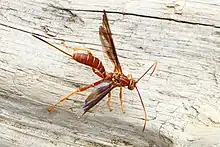| Labeninae | |
|---|---|
 | |
| Labena grallator, Virginia | |
| Scientific classification | |
| Domain: | Eukaryota |
| Kingdom: | Animalia |
| Phylum: | Arthropoda |
| Class: | Insecta |
| Order: | Hymenoptera |
| Family: | Ichneumonidae |
| Subfamily: | Labeninae Ashmead,1900 |
| Tribes | |
| |
The Labeninae is a subfamily within the parasitoid wasp family Ichneumonidae. The family is divided into 12 extant genera grouped within four tribes.[1]
Distribution
Labeninae are predominantly found in Australia and South America. A few species of Labena and Grotea are found in North America. Research suggests that the family originated on Gondwana before the break-off of Australia.[1]
Biology
Some species from the tribe Labenini have been reared from wood-boring beetles of the Coleopteran families Buprestidae, Cerambycidae, and Curculionidae.[1][2] Members of the tribe Groteini parasitize solitary bees; Labium wasps are known to parasitise ground-nesting, solitary bees,[3][4] while Grotea are known parasitoids of cavity-nesting, solitary bees.[1][5] Species of Poecilocryptus are thought to be phytophagous, due to adaptations of the larval head capsule.[6] However, as with much of the Ichneumonidae, knowledge of many labenine species' ecology, biology, and evolution is extremely limited or completely lacking.
Genera
These genera belong to the subfamily Labeninae:[1][7][8]
Tribe Groteini
- Grotea Cresson, 1864 c g b
- Labium Brullé, 1846 c g
- Ozlabium Gauld & Wahl, 2000 c g
Tribe Labenini
- Apechoneura Kriechbaumer, 1890 c g
- Certonotus Kriechbaumer, 1889 c g
- Gauldianus Lanfranco, 2000 c g
- Labena Cresson, 1864 c g b
- Torquinsha Gauld & Wahl, 2000 c g
Tribe Poecilocryptini
- Alaothyris Gauld, 1984 c g
- Poecilocryptus Cameron, 1901 c g
- Urancyla Gauld, 1984 c g
Tribe Xenothyrini
- Xenothyris Townes, 1969 c g
Data sources: i = ITIS,[9] c = Catalogue of Life,[10] g = GBIF,[11] b = Bugguide.net[12]
References
- 1 2 3 4 5 Gauld, Ian D.; Wahl, David B. (July 2000). "The Labeninae (Hymenoptera: Ichneumonidae): a study in phylogenetic reconstruction and evolutionary biology". Zoological Journal of the Linnean Society. 129 (3): 271–347. doi:10.1111/j.1096-3642.2000.tb00015.x. ISSN 0024-4082.
- ↑ Herrera-Flórez, Andrés (2012-08-01). "A new species of Apechoneura Kriechbaumer (Hymenoptera, Ichneumonidae, Labeninae) from Colombia". ZooKeys (213): 41–49. doi:10.3897/zookeys.213.3309. ISSN 1313-2970. PMC 3426873. PMID 22933853.
- ↑ Batley, Michael; Brandley, Barry (March 2014). "Phenology of the Australian solitary bee species 'Leioproctus plumosus' (Smith) (Hymenoptera: Colletidae)". Australian Entomologist, the. 41 (1): 7.
- ↑ Tarlton, Rayment. "A cluster of bees: sixty essays on the life-histories of Australian bees by Tarlton Rayment". Andrew Isles Natural History Books. Retrieved 2019-12-18.
- ↑ Flores-Prado, Luis; Niemeyer, H M (2012-05-30). "Host Location by Ichneumonid Parasitoids is Associated with Nest Dimensions of the Host Bee Species". Neotropical Entomology. 41 (4): 283–287. doi:10.1007/s13744-012-0048-6. ISSN 1519-566X. PMID 23950063. S2CID 5100022.
- ↑ Ward, D. (2014). "Poecilocryptus zealandicus sp. n.(Hymenoptera: Ichneumonidae: Labeninae) from New Zealand". New Zealand Entomologist. 34 (1): 37–39. doi:10.1080/00779962.2011.9722206.
- ↑ "Synoptic Lists of World Genera and Family-group Names". American Entomological Institute, Genera Ichneumonorum Nearcticae. Retrieved 2018-05-16.
- ↑ Carlson, Robert W. (1979). "Ichneumonidae". In Krombein, Karl V.; Hurd, Paul D. Jr.; Smith, David R.; Burks, B.D. (eds.). Catalog of Hymenoptera in America North of Mexico. Vol. 1. Symphyta and Apocrita (Parasitica). Washington, D.C.: Smithsonian Institution Press. p. 385 –386.
- ↑ "ITIS, Integrated Taxonomic Information System". Retrieved 2018-05-16.
- ↑ "Catalogue of Life". Retrieved 2018-05-16.
- ↑ "GBIF". Retrieved 2018-05-16.
- ↑ "Labeninae Subfamily Information". BugGuide.net. Retrieved 2018-05-16.
Further reading
- Townes, H.K. (1969) Genera of Ichneumonidae, Part 1 (Ephialtinae, Tryphoninae, Labiinae (=Labeninae), Adelognathinae, Xoridinae, Agriotypinae). Memoirs of the American Entomological Institute 11: 1–300.